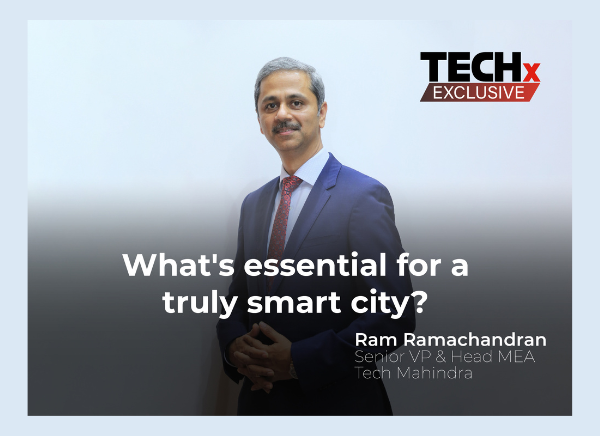23 December 2024, Mon |
8:55 AM

Ram Ramachandran, Senior VP & Head of MEA at Tech Mahindra
Smart cities are built on smart IT strategies. Numerous examples reflect a successful interplay of new-age technologies in developing smart cities, be it smart meters to collect waste management, water usage, and air quality data, sensor-activated streetlights to conserve energy, or monitoring systems to enhance public safety. Technology is omnipresent. The Middle East has always been at the helm of such transformation, which is powered by technologies such as artificial intelligence and big data intelligence.
Some of the greatest cities in the world have many things in common – smart businesses, smart infrastructure, and smart governance; however, technology plays a large role in making them what they are. While they, too have, had their share of challenges, such as administrative bottlenecks, traffic congestion, environmental pollution, and security threats, to name a few, cities have been ironing out their issues by implementing smart technologies.
Technology is at the heart of this metamorphosis, with AI and data-driven results as the foundation. With an anticipated 80% of the global population abiding in urban areas by 2050, there’s a significant prospect of establishing eco-friendly and efficient cities. As per the stats by the UAE Ministry of Economy, the global smart cities market is projected to reach roughly $873.7 billion by 2026, growing at a CAGR of 13.8%. The smart buildings market is projected to reach roughly $229.1 billion by 2026, and the global mobility service market will rise to about $40.1 billion by 2030. These developments are already evident in surveillance and security as cities grow more complex, prioritizing citizen safety and resource optimization.
New-age technology and data can enhance efficiency, sustainability, and the overall quality of life. With cities across the globe growing at an unprecedented pace, the smart city concept has emerged as a promising solution for addressing the numerous challenges faced by urban habitats. We have been involved in various smart city projects across the world including a key development in the Kingdom of Saudi Arabia where we provide, through a subsidiary, advanced transformative technology. This includes cognitive city development products and services, platform and product engineering services and solutions, network services, metaverse services and solutions, intellectual property development services, and cognitive solutions and services.
An ever-expanding evolution of AI-powered technology has a transformative impact on various aspects of our lives. According to a recent report by McKinsey Global Institute, the adoption of smart city technology can elevate the quality of life, including safety, employment opportunities, cost of living, and health, by a remarkable margin of 10 to 30%.
MENA Region Showcasing its Smart Prowess
The Middle East is at a pivotal junction with the convergence of urban development and rapid technology innovation, encompassing tools such as Data-driven video technology, utilising AI, and smart city infrastructure. GCC countries are making bold moves to accelerate digital adoption in every sphere of life to develop and strengthen a sustainable economic model. For instance, Saudi Arabia has created its Saudi Vision 2030 program, and the United Arab Emirates is driving initiatives through its UAE Digital Government Strategy 2025, with the strategy already bearing fruits. With all these measures, investments in digital transformation across the Middle East, Turkey, and Africa (Meta) region are projected to surpass $74 billion by 2026, helping organisations achieve long-term stability and growth, according to an International Data Corporation (IDC) study.
Amidst all these transformations, the Middle East has been heralding a new era in sustainability and energy efficiency. Smart cities deploy technology to reduce energy use, optimize resources, and drastically reduce carbon emissions with smart grids and efficient infrastructure. While investigating sustainable technology alternatives, generative AI is emerging as a key player. This technology has the potential to enhance city operations by analysing data to identify issues and detect efficiencies. Generative AI can optimize city services, simulate urban scenarios, and inform decision-making, leading to more efficient, liveable, and sustainable cities.
Smart cities represent a paradigm shift in urban development by empowering citizens, enhancing services, and improving the overall quality of life. With the fast-paced evolution of technology, all the stakeholders, including policymakers, technology solution providers, and citizens, must take a comprehensive approach to ensure that smart city initiatives benefit all citizens and create a more equitable and sustainable future for everyone.
For a city to truly become smart, citizen-centric solutions that address community needs while ensuring data privacy and security through transparent policies must be prioritized. The good news is that forward-looking technology solutions companies are committed to developing innovative solutions by leveraging next-generation technologies to devise and manage smart solutions for cities, local governments, enterprises, and industries, which not only benefit the citizens but also address their overall impact on the environment. All in all, the amalgamation of Gen Next technologies such, as artificial intelligence in futuristic urban planning, demonstrates sustainable paradigms for urban habitats.